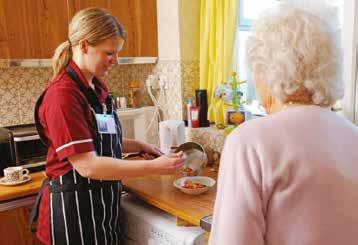
4 minute read
Housing with support
If you are finding it more difficult to live in and maintain your home, you may be considering different housing options. If you have low-level support needs, one option is sheltered housing. If you have a higher level of care and support needs, Extra Care Housing could be a good solution.
Sheltered and retirement housing
Sheltered and retirement housing is suitable for people who can live independently. It provides the peace of mind that there are some on-site services available that can provide low-level support.
There are many types of sheltered schemes and retirement housing, available to rent or to buy. They are provided by district councils and housing associations. Schemes usually consist of between 15 and 40 dwellings. These may be bedsit rooms, self-contained flats, bungalows or luxury apartments. The complex is often built around a garden or communal facility and is linked to a central control centre for security. Some schemes are simply housing for older people and are linked to a community alarm. Many schemes have a scheme manager or support worker and a community alarm service. There are often communal facilities, such as a lounge, laundry, guest flat and garden. Meals are not normally provided, but a few schemes include a restaurant, and some can arrange hot meals.
Private developers also build retirement housing for older people, who are usually over 55, to buy or to rent, or for shared ownership. They set their own entry criteria for people with care and support needs.
Extra Care Housing
Extra Care Housing is a purpose-built or adapted form of housing with self-contained, accessible and affordable one- or two-bedroom flats or bungalows that you can rent. It allows you to live as independently as possible, in the security and privacy of your own home. It also gives you the peace of mind that someone is on call if you need any help.
If you have regular care and support needs, they can be met by the on-site team of care and support workers. Your support is tailored to your own situation and can easily be adjusted if your needs change.
You can have help with things like: • Washing, dressing and personal care. • Preparing snacks and heating up meals. • Shopping and laundry. • Some domestic tasks. There is also a member of staff on site at night, who you can call in an emergency by activating a lifeline which is available in each property. Communal facilities are also provided. These vary between schemes, but may include a lounge, craft rooms with organised activities, a laundry, a garden and guest rooms.
A library, hairdressing and lunchtime meals are available at most schemes. They are often located close to local shops and amenities.
All Extra Care schemes have on-site staff who are responsible for delivering support, including: • Making sure you are OK each day. • Help with correspondence. • Assistance in making health appointments, such as with your GP. • Helping you deal with money matters. • Helping you to access other services, such as a handyperson service.
To apply for Extra Care Housing, you must first contact the landlord to discuss your requirements. If the landlord thinks you may be eligible, you may be invited to visit the scheme and complete an application on Homefinder. A trusted assessor from our care providers or an Adult Social Care worker will help assess your care and support needs in the first instance. Applicants who it is felt would benefit from Extra Care Housing will ultimately require a full needs assessment by Adult Social Care. Adult Social Care and the landlord are responsible for agreeing who can move into Extra Care and who has priority. A panel meets to discuss and allocate eligible applicants monthly, but there may be a waiting time for some accommodation.
For more information, visit:
www.somerset.gov.uk/social-care-and-health/
adult-social-care-information-sheets and select ‘D6 Extra Care Housing’.
Pathways
Housing-related support is now provided through two ‘pathways’ called Pathways to Independence (P2I) and Pathway for Adults (P4A).
Somerset Pathways to Independence (P2I) is a multi-agency, integrated housing-related support service for young people aged 16 to 25.
It includes care leavers who live in, or have a local connection with, the Somerset area. The service allows young people with housing-related needs to progress along a pathway of personal goals until they can live independently. First and foremost, it tries to prevent the need for a young person to step onto the pathway at all, through targeted prevention measures.
The P2I service aims to prevent youth homelessness and enable the young people who are accommodated to progress from support and supervision to independent living by providing:
• Targeted prevention through mediation to enable young people to remain in the family home (where appropriate).
• Floating support.
• Emergency accommodation.
• Supported accommodation.
• Support to identify move-on accommodation.
• Resettlement support.
The Pathway for Adults (P4A) programme purchases a range of support services for single people experiencing poor mental health who have difficulty in getting and keeping a tenancy. Rent and other housing costs are usually funded through Housing Benefit from district councils. We contribute to the cost of support staff that help people develop the skills they need to get a tenancy and keep it.
This service supports people who do not have the resilience or resources, either by themselves, or with their family or community, to overcome problems of exclusion and helps them to find stability. The service has three elements:
1. Outreach support to help prevent people from becoming homeless or to help them retain an existing tenancy.
2. Support in provider-managed accommodation.
3. Support with resettlement to more sustainable longer-term accommodation.
You can find more information and details of services in Somerset at: www.somerset.gov.uk








